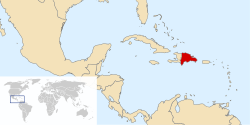España Boba
| Capitanía General de Santo Domingo | ||||||||||
| Colony of Spain | ||||||||||
|
||||||||||
|
||||||||||
| Capital | Santo Domingo | |||||||||
| Languages | Spanish | |||||||||
| Government | Monarchy | |||||||||
| King | ||||||||||
| • | 1813-1821 | Ferdinand VII | ||||||||
| Governor | ||||||||||
| • | 1809-1811 | Juan Sánchez Ramírez | ||||||||
| • | 1821 | Pascual Real | ||||||||
| History | ||||||||||
| • | Human settlement | Before 1493 | ||||||||
| • | European settlement | 1809 | ||||||||
| • | Ceded western portion to France | 1697 | ||||||||
| • | Ceded eastern portion to France | 1795 | ||||||||
| • | Recovered eastern portion | 1809 | ||||||||
| • | Independence | December 1, 1821 | ||||||||
| Area | 48,442 km² (18,704 sq mi) | |||||||||
| Currency | Santo Domingo real | |||||||||
|
||||||||||
| Today part of |
|
|||||||||
In the history of the Dominican Republic, the period of España Boba ("Foolish Spain") lasted from 1809 to 1821, during which the Captaincy General of Santo Domingo was under Spanish rule, but the Spanish government exercised minimal powers because its resources were attenuated by the Peninsular War and the various Spanish American wars of independence. The period ended when Dominican officials declared a short-lived independence on 30 November 1821. In February 1822, Haiti annexed former Santo Domingo, leading to an occupation that lasted until 1844.
Spanish Santo Domingo had been ceded to France as a result of the Peace of Basel in 1795. Many Dominicans chose to go into exile in Cuba, Puerto Rico and other Spanish areas. France, nevertheless, maintained only nominal control over the acquired area, with most of the colony's administration staffed by Dominicans and Spaniards and Spanish laws and traditions maintained. The situation turned worse when the declaration of an independent Haiti in 1804 increased hostilities on the island and commerce with the western part of the island was lost.
The start of the Peninsular War changed the political situation. Spain was now once again at war with France, although a French-appointed king, Joseph Bonaparte, tried to claim the allegiance of Spaniards everywhere. Exiled Dominicans who were opposed to the French began returning to the island and organized small expeditionary forces in Puerto Rico under Juan Sánchez Ramírez, which received British naval aid. Britain had never accepted the cessation of Santo Domingo to France, which it considered a violation of the Treaty of Utrecht. The Dominican and Puerto Rican forces defeated the smaller but better-armed French army on November 7, 1808, at the Battle of Palo Hincado.
During the next twelve years, Santo Domingo's economy suffered. Most farming was solely for subsistence, there was little specie on the island, and, once political stability returned to Spain in 1814, its focus was on the more productive island of Cuba.
...
Wikipedia



